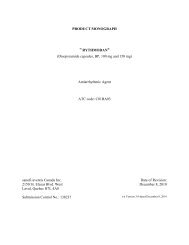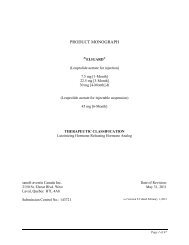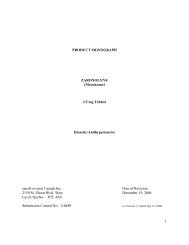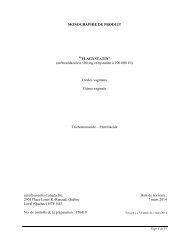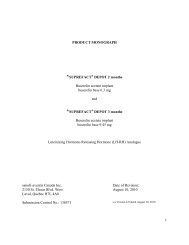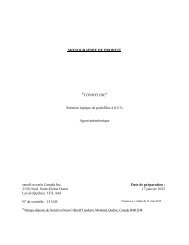Apidra (insulin glulisine) - Sanofi Canada
Apidra (insulin glulisine) - Sanofi Canada
Apidra (insulin glulisine) - Sanofi Canada
You also want an ePaper? Increase the reach of your titles
YUMPU automatically turns print PDFs into web optimized ePapers that Google loves.
if you notice your <strong>insulin</strong> requirements changing<br />
markedly. Other factors that may affect your dose of<br />
<strong>insulin</strong> or your need to do additional blood/urine<br />
testing are:<br />
Illness<br />
Illness, especially with nausea and vomiting, diarrhea<br />
and/or fever, may change how much <strong>insulin</strong> you need.<br />
Even if you are not eating, you will still require <strong>insulin</strong>.<br />
You and your health professional should establish a<br />
sick day plan for you to use in case of illness. When<br />
you are sick, test your blood/urine frequently and call<br />
your health professional as instructed.<br />
Pregnancy<br />
If you are planning to have a baby, are pregnant, or are<br />
nursing a baby, consult your health professional. Good<br />
control of diabetes is especially important for you and<br />
your unborn baby. Pregnancy may make managing<br />
your diabetes more difficult.<br />
Medication<br />
Always discuss any medications you are taking,<br />
prescription or “over-the-counter”, with your health<br />
professional. To prevent drug interactions, volunteer<br />
the names of everything you are taking even before<br />
they ask if there have been any changes. Insulin<br />
requirements may be increased in the presence of drugs<br />
with hyperglycemic activity, such as contraceptives<br />
(for example, birth control pills, injections and patches)<br />
and hormone replacement therapies, corticosteroids,<br />
thyroid replacement therapy, and sympathomimetic<br />
agents such as decongestants and diet pills. Insulin<br />
requirements may be reduced in the presence of drugs<br />
with hypoglycemic activity, such as oral antidiabetic<br />
agents, salicylates (for example, aspirin), sulfa<br />
antibiotics, blood pressure medications including ACE<br />
inhibitors, and certain psychiatric medications<br />
including MAO inhibitors or antidepressants and antianxiety<br />
medications.<br />
Substances including beta-blockers, used for<br />
conditions including blood pressure, heart arrhythmias,<br />
palpitations and headache, and alcohol may enhance or<br />
weaken the blood-glucose-lowering effect of <strong>insulin</strong>s,<br />
and signs of hypoglycemia may be reduced or absent.<br />
Exercise<br />
If your exercise routine changes, discuss with your<br />
health professional the possible need to adjust your<br />
<strong>insulin</strong> regimen. Exercise may lower your body's need<br />
for <strong>insulin</strong> during and for some time after the activity.<br />
As for all <strong>insulin</strong>s, the rate of absorption, and<br />
consequently the onset and duration of action, may be<br />
affected by exercise and other variables.<br />
Travel<br />
Consult your health professional concerning possible<br />
IMPORTANT: PLEASE READ<br />
adjustments in your <strong>insulin</strong> schedule if you will be<br />
traveling across time zones. You may want to take<br />
along extra <strong>insulin</strong> and supplies whenever you travel.<br />
Missed dose:<br />
If you have missed a dose of APIDRA or if you have<br />
not injected enough <strong>insulin</strong>, your blood sugar level<br />
may become too high (hyperglycemia). Check your<br />
blood sugar frequently. For information on the<br />
treatment of hyperglycemia, see “Side Effects and<br />
What To Do About Them” below.<br />
Do not take a double dose to make up for a forgotten<br />
dose.<br />
Overdose:<br />
If you have injected too much APIDRA, your blood<br />
sugar level may become too low (hypoglycemia).<br />
Check your blood sugar frequently. In general, to<br />
prevent hypoglycemia you must eat more food and<br />
monitor your blood sugar. For information on the<br />
treatment of hypoglycemia, see “Side Effects and What<br />
To Do About Them” below.<br />
Hypoglycemia may occur as a result of an excess of<br />
<strong>insulin</strong> relative to food intake, energy expenditure, or<br />
both.<br />
In severe cases, coma, seizure and brain disorders may<br />
be seen and treated with glucagon (injected in the<br />
muscle or subcutaneous tissue) or glucose (injected in<br />
the vein).<br />
You should continue checking your blood sugar even if<br />
you feel better because hypoglycemia may recur.<br />
In case of drug overdose, contact a health<br />
professional, hospital emergency department or<br />
regional Poison Control Centre immediately, even<br />
if there are no symptoms.<br />
INSTRUCTIONS FOR USE<br />
Your doctor has recommended the type of <strong>insulin</strong> that<br />
he/she believes is best for you. DO NOT USE ANY<br />
OTHER INSULIN EXCEPT ON THE ADVICE AND<br />
DIRECTION OF YOUR DOCTOR.<br />
CAREFULLY FOLLOW THE PACKAGE<br />
DIRECTIONS SUPPLIED WITH THE<br />
SOLOSTAR TO:<br />
• HELP AVOID CONTAMINATION AND<br />
POSSIBLE INFECTION<br />
• OBTAIN AN ACCURATE DOSE.<br />
INJECTION PENS, CARTRIDGES, NEEDLES, AND<br />
SYRINGES MUST NOT BE SHARED.<br />
Page 58 of 61



